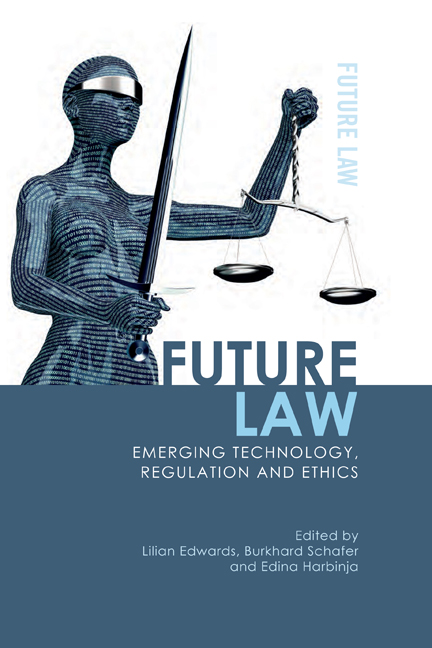Book contents
- Frontmatter
- Contents
- List of Contributors
- List of Figures and Tables
- Table of Cases
- Table of Legislation
- 1 The Future’s Already Here: It’s Just Unevenly Edited
- Part I From Privacy and Princesses, to Security and Star Wars
- 2 Privacy and Identity through the Eyes of Disney Princesses
- 3 White Noise from the White Goods? Privacy by Design for Ambient Domestic Computing
- 4 Citizen-consumers in a Personalised Galaxy: Emotion-influenced Decision Making, a True Path to the Dark Side?
- 5 Big Data Ethics: Darth Vader and the Green Cross Man
- 6 Security Vulnerabilities, Backdoors, Exploits and the Marketplace for Each: The Return of Boba Fett – Bug Bounty Hunter in the New Republic
- Part II A Matter of (Future) Life and Death
- 7 Will My Genes Really Help Me Fit Into Those Jeans? Personal Genomics and Wrap Contracts
- 8 On Living and Undead Wills: ZombAIs, Technology and the Future of Inheritance Law
- 9 ‘Be Right Back’: What Rights Do We Have over Post-mortem Avatars of Ourselves?
- Part III Regulating Autonomous Technologies: Software Are Doing it for Themselves
- 10 Autonomous Intelligent Agents and the Roman Law of Slavery
- 11 Autonomous Vehicles: An Analysis of the Regulatory and Legal Landscape
- Part IV Textual Poaching: Copyright in a Remixed World
- 12 Living in a Remixed World: Comparative Analysis of Transformative Uses in Copyright Law
- 13 Repost This: Instagram and the Art of Re-photography
- Index
2 - Privacy and Identity through the Eyes of Disney Princesses
Published online by Cambridge University Press: 17 September 2020
- Frontmatter
- Contents
- List of Contributors
- List of Figures and Tables
- Table of Cases
- Table of Legislation
- 1 The Future’s Already Here: It’s Just Unevenly Edited
- Part I From Privacy and Princesses, to Security and Star Wars
- 2 Privacy and Identity through the Eyes of Disney Princesses
- 3 White Noise from the White Goods? Privacy by Design for Ambient Domestic Computing
- 4 Citizen-consumers in a Personalised Galaxy: Emotion-influenced Decision Making, a True Path to the Dark Side?
- 5 Big Data Ethics: Darth Vader and the Green Cross Man
- 6 Security Vulnerabilities, Backdoors, Exploits and the Marketplace for Each: The Return of Boba Fett – Bug Bounty Hunter in the New Republic
- Part II A Matter of (Future) Life and Death
- 7 Will My Genes Really Help Me Fit Into Those Jeans? Personal Genomics and Wrap Contracts
- 8 On Living and Undead Wills: ZombAIs, Technology and the Future of Inheritance Law
- 9 ‘Be Right Back’: What Rights Do We Have over Post-mortem Avatars of Ourselves?
- Part III Regulating Autonomous Technologies: Software Are Doing it for Themselves
- 10 Autonomous Intelligent Agents and the Roman Law of Slavery
- 11 Autonomous Vehicles: An Analysis of the Regulatory and Legal Landscape
- Part IV Textual Poaching: Copyright in a Remixed World
- 12 Living in a Remixed World: Comparative Analysis of Transformative Uses in Copyright Law
- 13 Repost This: Instagram and the Art of Re-photography
- Index
Summary
Once Upon a Time …
Once upon a time there were eleven beautiful princesses. In many ways they were very different: they came from all over the world, from different periods of history, some from fiction, some from fact, some from fairy tale or folklore, some whose stories were shaped in the modern era. Though the films they grace were created in many different times and for widely different audiences, the stories of each of these fair princesses have distinct similarities, and not simply because the protagonists are all beautiful, troubled and beset by powerful enemies. Each highlights a key issue or issues about privacy and identity that are as relevant to today's online world as they were in the princesses’ own realms and eras.
That they do so is neither happenstance nor some carefully crafted plan of Disney. Rather, it reflects something more important: privacy is a perennial issue, not a modern or transient indulgence as is sometimes suggested, an idea that did not exist in the past and will not exist in the future. That all these tales demonstrate the importance of privacy and identity rights is thus something that should be taken seriously – as should the rights themselves, which are also, at times, in danger of being dismissed as unimportant, outdated or even self-indulgent in the face of other, seemingly more grown-up issues such as security or economic prosperity.
The earliest of the princesses, Snow White, appeared in Disney's first full-length animation, Snow White and the Seven Dwarfs, in 1937, but it wasn't until 2000 that ‘Disney Princesses’ became an official franchise. At that point there were nine ‘official’ Disney Princesses – as of July 2018 there were eleven, with a number of other unofficial princesses lurking around the edges. The franchise has an official website and a massive commercial arm. Disney takes its Princesses very seriously: when Rapunzel became the tenth official Princess, she had a ‘coronation’ in Kensington Palace in London.
- Type
- Chapter
- Information
- Future LawEmerging Technology, Regulation and Ethics, pp. 13 - 40Publisher: Edinburgh University PressPrint publication year: 2020



